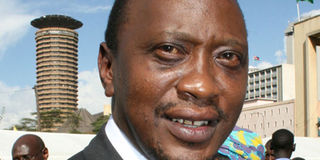Uhuru’s Budget the biggest in history

Uhuru Kenyatta, Kenya's Finance minister. He is set to read a Sh997 billion budget, setting a new spending record in the country’s history. Photo/File
Finance minister Uhuru Kenyatta will Thursday afternoon read a Sh997 billion budget, setting a new spending record in the country’s history.
Budget estimates for the 2010/2011 financial year released on Wednesday show the government will spend Sh110 billion above last year’s Sh867 billion, representing an increase of 12.5 per cent. This puts pressure to raise more revenues from either borrowing, selling its stakes in businesses and, most probably, increasing taxes.
Pay salaries
According to the documents, Sh675 billion will go into recurrent expenditure, up Sh68 billion from the previous year, mainly to pay salaries for government workers. At a time when economic recovery has slowed down, growing only 2.6 per cent in 2009 even as the budget kisses the one-trillion-shilling mark, the government will come under critical focus over its spending priorities.
Development expenditure, a pointer to areas the government seeks to stimulate, has ballooned from Sh258 billion to Sh321 billion, with most of the cash funnelled into sectors seen as key to economic growth, including agriculture, water and irrigation.
Treasury projects to raise Sh630 billion in taxes and Sh143 billion from development partners, leaving a Sh223 billion financing deficit.
On Thursday, economists were cautious, saying even with increased spending more direct investments would be needed to sustain growth.
“One of the challenges has been the slow and low level of private sector investment, which is key to stimulating the economy,” said Mr Raphael Muya of the Institute of Economic Affairs.
Urgent measures
“If urgent measures are taken to stir private investment through subsidies, then for sure we shall experience high return in terms of growth.”
Overall the Ministry of Education is the biggest beneficiary in terms of budgetary allocation, taking a combined Sh140.5 billion, Sh131 billion in recurrent expenditure and Sh9.5 billion in development expenditure. It is followed by Roads, which gets Sh104 billion, up from Sh80.2 in the current fiscal year, which ends on June 30.
The government has been sprucing up the road network over the past three years and more allocation is expected to accelerate projects to ease transport costs for business. The Office of the Deputy Prime Minister and Ministry of Finance is getting Sh53 billion compared to Sh30.8 billion the year before. The Ministry of Higher Education’s budget has almost been doubled to Sh49.2 billion from Sh27.2 billion last year. Closing the top five is the Ministry of State for Provincial Administration, which has been given a slight raise from Sh45.9 billion to Sh46.2 billion.
The Office of the Deputy Prime Minister and Ministry of Finance has seen its recurrent expenditure allocation increased by Sh14.8 billion to Sh31.2 billion in the fiscal year 2010/11. This is to finance the recruitment of accountants, high cost of goods and services and provision for pending bills owed to Telkom (K) Ltd and budget reserves.
The Ministry of Education’s recurrent budget goes up by Sh11.4 billion it received in the current year to Sh128.6 billion in the next fiscal year to fund the teachers salary review, provision of free primary and secondary education, early childhood development education and district education services.
Similarly, a review of secondary school teachers and university lecturers and non-teaching staff salaries has seen the Higher Education ministry’s share going up by Sh2.6 billion to Sh26 billion.
The Ministry of Energy’s recurrent expenditure allocation also goes up by Sh1.9 billion to Sh2.1 billion as the government moves to finance the exploitation of alternative sources of energy and distribute power to the rural areas.
The money, according to the estimates, will go towards the operations of relevant state-owned firms -Kenya Electricity Transmission Company, Rural Electrification Authority and Geothermal Development Company.
In a move that signals the government’s shift from curative to preventive medicine, the Ministry of Public Health and Sanitation has received an extra Sh2.2 billion to bring its total recurrent allocation to Sh9.5 billion in the next fiscal year. “The increased allocation is as a result of enhanced staff transfer from the Ministry of Medical Services and absorption of contract staff,” say the estimates.
Those whose budgets were slashed are the Ministry of Medical Services which has lost Sh1.3 billion to Sh21.8 billion in the next fiscal year.
The Ministry of Defence has had its allocation reduced by Sh1.4 billion to Sh46.9 billion the next fiscal year while the Consolidated Fund Services has been reduced by Sh3 billion.
Following the conclusion of the national population and housing census last year, whose results are yet to be released, the Ministry of Planning and National Development will get Sh2.1 billion down from Sh9.2 billion it received in the 2009/10 fiscal year.
The Ministry of Livestock loses Sh1.1 billion to get Sh3.6 billion after Mr Kenyatta decided not to provide for drought mitigation. The Interim Independent Electoral Commission’s budget has been reduced by Sh1.5 billion from last year’s Sh6.8 billion it received in the current fiscal year to Sh5.3 billion in the next fiscal year, even as it inches closer to the August 4 constitutional referendum.
Also losing is the Ministry of Special Programmes from Sh7.5 billion it received last year to Sh4 billion in 2010/11.



